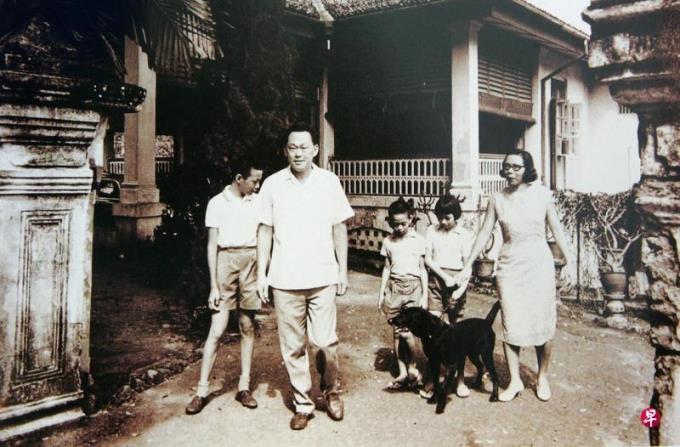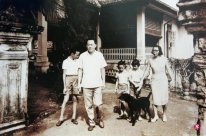
If the prospects of Singapore are "holding a referendum for most people to decide", it will be farther and farther away from a democratic society, because there is a lack of a few but professional perspectives.Lost full of hate.
This building at No. 38 Oxley Road was built more than a hundred years ago. It was the apartment of the founding of the founding of the National Prime Minister Li Guangyao from the 1940s to the death of 2015.Li Xianlong, Li Weiling and Li Xianyang of the Li family are also born here.With the death of Dr. Li Weiling in October 9, the history of this building as Li family's house can be said to come to an end.
Regarding the stay at 38 Ou Sili Road, since the death of Mr. Lee Kuan Yew, it has caused warm discussions in Singapore.A few days ago, Li Xianyang, who claimed to obtain British political asylum, posted on Facebook, and urged Prime Minister Huang Xuncai to dismantle the residence of the Li family immediately in accordance with the Li Guangyao's will, causing the government to respond and believe that there is no need to be so urgent.On October 26th, the United Zard Digital Digital Development Development and News said that the official has an open attitude towards Lee Kuan Yew's former residence, including the solution that does not rule out the demolition, reserves part or all buildings, so that this generation and future Singaporeans have time to make decisions.
The statement pointed out that Li Guangyao wrote to the cabinet on December 27, 2011, saying that he noticed that the cabinet members agreed that 38 Ou Sili Road should not be demolished.Number, then it must be strengthened to renovate the entire building.Not completely excluded, only care about whether the century -old building structure can durable.
Throughout the argument at 38 Ou Sili Road, it is not difficult to find that it is caused by the different cognition of the historical status of the building.
Historical architecture, do not go back
In December 2015, Yougov Survey released a poll results that 77%of Singaporeans supported Li Guangyao's former residence for demolition, and only 17%of them opposed it.The engraving on the English Internet has aroused heated discussions. Most of the citizens' messages are in favor of demolition. The reason is that Li Guangyao's will must be observed, and Li's willingness should not be violated.
The Singaporean's reaction is not surprising at all.Deep reasons should come from the long -term and stable authoritarian governance of the "Li Guangyao Times".A country that has just left British colonial rule and strives to be independent. In the lifetime of the founding leaders, it can see it jumped from the third world to a developed country, explaining the rationality of authoritarian politics.However, authoritarian politics also has its sequelae: What should the people do?Many years ago, I heard a parable: the cow was tied to my nose for a whole day, and I took the nasal embolism, but the cow did not know how to go home.
Obviously, the thinking of the Singapore people, if it is still in the stage of Law By Law, it is said that it is not possible, then we will never be able to introduce new and welcome new challenges.If Singapore's prospects are "referendum to make most people decide", it will be farther and farther away from democratic society, because there is a few but professional perspectives that these decisions are often wrong, and even hate.The host of the online video said that this is a historical building, and it cannot be recovered as soon as it is lost.
The State Administration of Cultural Relics issued a statement on October 24, announcing that it will study whether there is a national history, culture and architectural value worth reserved, and then submit suggestions to the culture, community and youth ministers.The Minister will decide whether to issue a preservation order at No. 38 Ou Sili Road under the preservation of the monuments.The Lianhe Zaobao also interviewed with the Electronics News, attracting Associate Professor Yang Yanshan: "Whether it is Li's home or anyone's home, as long as there is historical, social, and cultural value, it must be treated with legitimate procedures ...We must remember that this house is indeed related to the leaders of the Li family and the founding of the country, but there is a history before this house (Li family stays).I believe there are only about 20 seats.
In Singapore's political history, No. 38 Opti Road is the earliest member of the People's DAP (also the founding of the founding father), and the union leader, where the meeting in the underground dining room -it is Singapore's brewing from British colonial rule.Going to independent decision -making places.As Professor Yang pointed out that this house is a "true" existence, not a "historical attraction" that deliberately arranged for personal worship or party propaganda.
Seeing Thinking of Churchill's Former Residence
At this point, let the author recall that when traveling in 2002, he took a train to Sevenoaks and took a special bus to visit a period of experience in the former residence of Churchill (1874 to 1965) in Kent County.EssenceIn the Second World War, Churchill led the British to defeat the Nazis, but defeated the Labor Party in the National Election of the Nation after the war and was pulled off from the Prime Minister's seat.
The political figure of Churchill, through the visit of the villa, allows people to truly grasp the existence of his blood, blood, breathing and soul.The bunker -like former residence built deep in the suburbs has been fully retained by the British Nursing Organization National Trust.
National Trust is a civilian institution. It was established in 1895 and has retained a large number of historical buildings, gardens, villages, and nature reserves for more than 100 years.The organization declares that driving anywhere in the UK for 40 minutes will definitely reach the place of "public financial" that is protected.
Churchill was born in a nobleman, and his academic qualifications were not high. He finally won politics by relying on the military career of a hundred battles.The complex life background condenses in this manor as a timeless commemoration.Churchill's former residence is Chartwell, Chartwell, or Chate Spring.It was the industry he bought in September 1922. There were vast gardens and ponds around the building.Ascending from a distance, the mountains and water in Kent County were full of views.After the war, Churchill returned from Tangning Street to Chatewell's rose trail and green forest green wilderness.
The Chatewell Villa is exhibited in the real thing, there are no label descriptions of deliberate rendering, and there is no bronze statue of one right and one celebrity.During the toilet, I felt that the owner of the villa, Churchill, was at the scene, as if walking away, hiding in a dark corner in the jungle, a cigar -he returned soon!
A large armrest challenge is placed in front of the flowers, the paint is pure white, and there are small stools next to it.In the years of warfire, the owner of the chair was sitting leisurely on it, holding his mood and planning.Today, visitors who come and go are seeing things, as if I saw Churchill squeezed the cigar with a smile.Didn't he sit on a white chair?
Interestingly, Lee Kuan Yew was called "one of the most capable leaders" by US President Nixon, comparing with Churchill.The Chatwell Hills of Churchill seem to be almost the same as the age of 38 Opti Road.
The author is the local retireor




